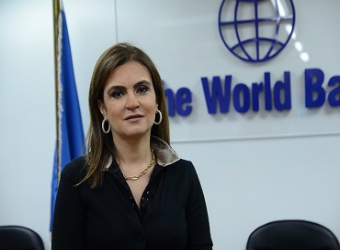Egypt’s Minister of Investment and International Cooperation Sahar Nasr met on Tuesday with a high-level mission from the World Bank Group (WB) to discuss improving the business environment in the country.
Egyptian Ministry of Investment and International Cooperation said that the mission, chaired by WB Vice-President Jan Walliser, is on a visit to Egypt to tackle advancing Egypt’s ranking in the Doing Business Report, which annually examines regulations and regulatory processes involved in setting up and operating a business in different economies worldwide.
Egypt went up four places in the Doing Business index for 2017, released in October 2016, compared to last year’s report; coming in 122nd out of 190 countries and taking fifth place among comparable economies in the Middle East region in terms of ease of doing business.
Egypt was preceded by the UAE, Turkey, Saudi Arabia, and Jordan.
Nasr said that the government has taken several measures to achieve economic growth and improve Egypt’s ranking in the Doing Business report, while commending the bank’s efforts in supporting the country’s development projects.
“The government has worked on the implementation of an ambitious economic and social programme to meet citizens’ needs and improve standards of living,” the Egyptian minister said during the meeting.
Since 2014, Egypt has embarked on a plan to introduce a number of fiscal reforms, including floating the pound, fuel subsidy cuts, as well as imposing new taxes to ease a growing budget deficit, which amounted to 12.2 percent in last financial year.
“WB mission commended the measures taken to improve Egypt’s ranking in the Doing Business report, while referring to its role in presenting the best international business practices to the Egyptian government so as to choose those that are in line with its programme,” the ministry further noted.
The meeting saw discussion on the measures taken by the government in the fields on which Egypt will be ranked, such as the commencement of business activities, the ease of obtaining access to credits, and regulation of the labour market.
The Doing Business Report measures factors including the time it takes to start a business, the ease of registering property, and access to credit.
In late December, Egypt signed with the director of the World Bank in Cairo a loan agreement for the second $1 billion tranche from a $3 billion loan package to support Egypt’s economic reform programme.
Egypt received the first tranche of the loan in September.
The current portfolio of the World Bank in Egypt includes 25 projects with a total commitment of about $8.5 billion, according to WB data.
Following the flotation of the local currency in November, the IMF approved the loan and the Central Bank of Egypt (CBE) received an initial $2.75 billion tranche.
Egypt’s foreign reserves reached $26.3 billion by the end of January 2017, up from around $16.5 billion in January 2016, the central bank said.
Source: Ahram online
